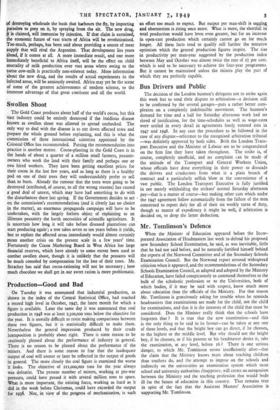Mr. Tomlinson's Defence
When the Minister of Education appeared before the Incor- porated Association of Headmasters last week to defend his proposed new Secondary School Examination, he said, as was inevitable, little that he had not said before, and he naturally fortified himself behind the reports of the Norwood Committee and of the Secondary Schools Examination Council. But the Norwood report aroused widespread criticism when it appeared, and the recommendations of the Secondary Schools Examination Council, as adapted and adopted by the Ministry of Education, have failed conspicuously to commend themselves to the bulk of the scholastic profession or to the Universities, both of which bodies, if it may be said with respect, know much more about education than the officials of the Ministry. For that reason Mr. Tomlinson is gratuitously asking for trouble when he reminds headmasters that examinations are made for the child, not the child for examinations, and that it is the interests of the child that must be considered. Does the Minister really think that the schools have forgotten that ? It is true that the new examination—and this is the only thing to be said in its favour—can be taken at any one of three levels, and that the bright boy can go direct, if he chooses, to the highest or the middle level. But why should not the bright boy, if he chooses, or if his parents or his headmaster desire it, take the examination, at any level, before 16 ? There is one serious danger, to which Mr. Tomlinson seems insufficiently alive—that the claim that the Ministry knows more about teaching children than teachers do, and the attempt to impose on the schools and indirectly on the universities an examination system which most school and university authorities disapprove, will create an antagonism between the Ministry and the teaching profession that would bode ill for the future of education in this country. That remains true in spite of the fact that the Assistant Masters' Association is supporting Mr. Tomlinson.






































 Previous page
Previous page